Letter from the Director – June 2019




Women and Justice is an example of postmodernism gone viral within the Body of Christ, seeking to destroy it, and if the ELCA hopes to remain Christian in a way that will permit them to be recognized as such by other Christians not held captive to the postmodern mindset, they must not only reject it, but the worldview that informs it.
All Christian communions functioning within the increasingly-postmodern West must be on guard against the same virus that has so deeply infected the ELCA. We must fortify our immune systems against it if we hope to not have our health compromised… or worse, to die as non-Christians mouthing Christian-sounding words.
“Ah! Words! Just words!” the person shouted to the man at the lectern whose speech had just concluded. “Who told you culture is a search for coherence? Where do you get that idea from? This idea of coherence is a Western idea.”
Coherent
or Incoherent?
I heard Ravi Zacharias tell this story. With a quickness of wit that I can only marvel at, he responded to the person (whom he later learned was transgendered) by saying, “Before I answer you, Madame, let me ask you this, then: would you prefer that my answer be coherent or incoherent?”[1]
[1] https://www.rzim.org/read/just-thinking-magazine/an-ancient-message-through-modern-means-to-a-postmodern-mind
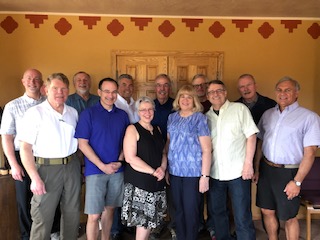


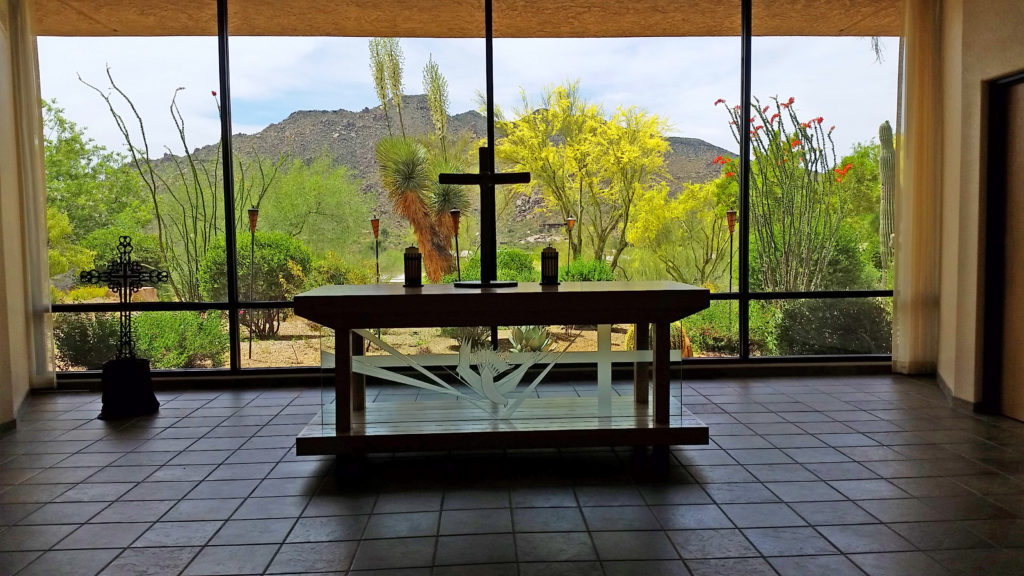
One thing I’ve learned over the years is that congregations can sometimes feel so desperate to call a pastor, any pastor, that they rush through the call process and sometimes make a bad decision. And if the process drags out, they become so discouraged that they simply drift – and some members just leave, often permanently. An experienced coach helps them understand that they really can see – and take – one small, necessary “discipleship step” after another; and each small step can strengthen their faith, prayer life, discipleship, fellowship, stewardship, and outreach.

Lutheran CORE is trying a new format for its newsletter and moving away from its traditional glossy magazine-style newsletter to one that is easier to read on small devices like cell phones and tablets. There will always be a printable version, but CORE will also have versions of the newsletter on our website and on Facebook that will make it easier for our readers to decide which articles they want to read and which they prefer to skip. We will also send out a version via email. If you would like to be added to the email list, please contact [email protected] with your name and email address.
Photo by Filip Mroz on Unsplash

In the March issue of our newsletter, CORE Voice, we included information about the ministries of two of the pastors who were going to be presenters at the Rekindle Your First Love event. Another one of the persons who was scheduled to be a presenter, NALC pastor Wendy Berthelsen, heads up a non-profit Christian teaching ministry called Call Inc., which mobilizes ordinary people “called” by Christ Jesus our Lord to “incorporate His call” into all of life, 24/7: home, family, church gathering and “glocal” (local to global).

I am continually blessed and encouraged by the very positive and uplifting responses which I receive to my letters from the director, articles in our newsletter, CORE Voice, and other written communications. It is good to know that people read our materials and appreciate, value, and support our work. The responses I received to my most recent (the April) letter from the director were no exception.
One NALC pastor wrote, “There have been times when I have wondered why CORE staff and adherents remain in ELCA, but after reading this letter, I am thankful that you are still there. If you were to leave, it would please them because they wouldn’t have to deal with your wisdom any more. . . .
Photo by Fred Kearney on Unsplash
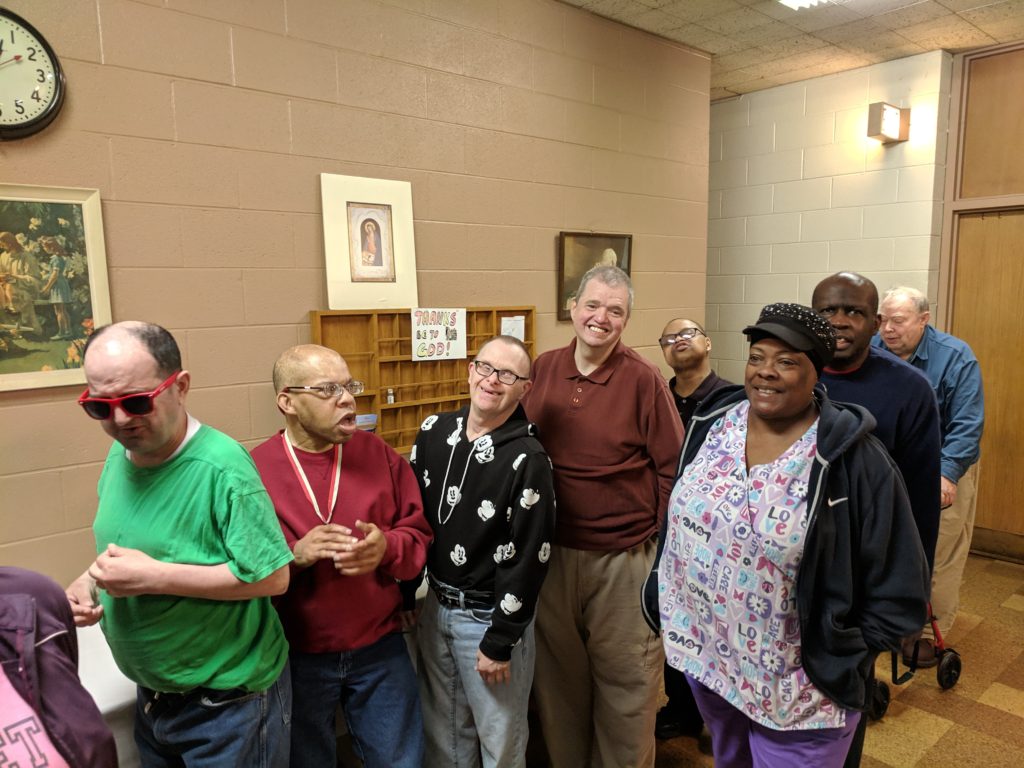
This program, for adults with special needs and sponsored by St. Timothy Lutheran Church, has been serving Chicago’s Hermosa neighborhood for nearly 30 years. Meeting monthly since 1990, the Uncle Charlie program serves an average of 50 residents from eight group homes on the northwest side of Chicago.

Books by Robert W. Jenson and Eric W. Gritsch!
Photo by Jonathan Simcoe on Unsplash



HAS THE ELCA SPUN OUT OF CONTROL?
My original plan was to share with you the letter I wrote to my synodical bishop regarding “Trustworthy Servants of the People of God.” That is the document which the ELCA was considering to replace “Visions and Expectations” as a statement of the behavior that is expected of pastors and deacons. But after receiving a very strong negative response to the document, the ELCA Church Council – at their meeting in early April – declined to consider it. Instead they referred it back to committee for further review and redrafting. After all of that, what I had been planning on writing seemed so out of date. Therefore, instead I will be reviewing and evaluating what the ELCA Church Council had to say as it decided not to consider for adoption a document which had been recommended to them by the Conference of Bishops.
First,
the ELCA continues to be obsessed with sex.
Any who thought (and maybe even hoped) that this obsession would subside
after the 2009 Churchwide Assembly should now see that this preoccupation will persist
until the radical, relentless LGBTQIA+ community and agenda get all that they
want. Many times we of Lutheran CORE
have been accused of being obsessed with sex, as we have been advocating for
the historic, traditional view of human sexuality that the vast majority of the
world’s Christians for two thousand years have understood the Bible to clearly
be teaching. We are not the ones who are
obsessed with sex. We are not the ones
who keep on bringing up the subject, always pushing the perimeters one step
further. Rather we are the ones who keep
on lifting up and holding onto traditional Biblical values and views as others
keep on pushing for an erosion of Biblical understanding and standards.
Second,
something is wrong if ELCA leaders do not realize by now what they have enabled
and even created by continuing to cater to the radical, relentless LGBTQIA+
agenda. They have allowed it to become
more and more prominent and empowered. One
group that appeared before the ELCA Church Council, which calls itself the
“Trustworthy Servants” Public Witness Team, wants at least 25% of the members
of a task force that would carry out the work of revision to be LGBTQIA
people. The traditional view was trashed
at last summer’s youth gathering, the LGBTQIA+ community was able to force the
firing of a seminary president, and ELCA leaders refuse to stand up to a
movement which rejects marriage by any definition as normative for sexual
activity. Is all this being allowed
because ELCA leaders agree with it, or do they feel powerless and unable to
stop it? Either way we have a serious
problem.
Third,
the ELCA expects its leaders to be trustworthy, while the ELCA itself is not
trustworthy. It was only after a very
long, painful, and divisive process that the 2009 Churchwide Assembly approved
the possibility of ordaining persons, and the possibility of congregations
calling persons, who are in publicly accountable, life-long, and monogamous
same gender relationships. And yet the
ELCA has neither honored the commitments that were made nor remained within the
boundaries of what was actually officially approved. The 2009 Social Statement, “Human Sexuality:
Gift and Trust,” describes a wide range of four positions on human sexuality
that exist within and that would have a place within “this church.” The “Trustworthy Servants” document describes
only one acceptable position – that “those who serve as pastors and deacons
reflect a variety of sexual orientations and diverse gender identities” (page
11). Even though the ELCA has broken
trust by developing a document that goes way beyond what the 2009 Churchwide
Assembly actually officially approved, it is not enough for the LGBTQIA+
community. They have risen up against
it, claiming that the document’s expectations concerning marriage are shame
producing and not life-giving. Therefore,
the ELCA Church Council declined to consider it and instead sent it back to
committee for review and rewriting – I assume until it turns out the way the
LGBTQIA+ community wants it.
Fourth,
I am not aware of any statement from the Presiding Bishop concerning this
fiasco. She will make and has made statements
on many things – including gun violence, immigration, the recent vote taken by
the United Methodist Church, and the Middle East. But on subjects where a statement from her
could elicit a strong negative response – such as standing up to the “We Are
Naked and Unashamed” movement, dealing with a prominent ELCA “public
theologian” who advocates for sex outside of marriage and “ethically sourced
pornography,” and addressing recent state legislation on abortion which is
clearly contrary to the ELCA social statement on abortion – she is silent.
Fifth,
what is the ELCA Church Council saying to and about the Conference of Bishops
when they decline to consider what the Conference had recommended? What are they saying to and about the Domestic
Mission unit, which developed this document?
What are they saying to and about the leaders of the ELCA for the first
twenty years of the life of the ELCA when they say that now they especially
want to hear from “those who have been most harmed by the misuse of ‘Visions
and Expectations’”? How will they feel
if twenty years from now the new leadership of the ELCA most wants to hear from
“those who have been most harmed” by the statements and actions of the current
leaders of the ELCA?
Having
made these five general statements about the Church Council’s response, I would
now like to comment on specific parts of their response.
First, the Church Council referred the document back to the Domestic Mission unit “for further review and redrafting that is governed by this church’s social teaching documents.” And then it gives “Sexuality” as an example of one of those social teaching documents. A couple things are significant here. For one, the review and redrafting are not to be governed by the Bible and the Lutheran confessions, but instead by “this church’s social teaching documents.” Once again, the ELCA sees itself as wiser and more insightful than the authors of the Bible and the writers of the Lutheran confessions. Also, if this review and redrafting truly were to be governed by this church’s social teaching documents, it would have to include and respect the wide range of views that are described and honored in the 2009 social statement, not just the one view that endorses a “variety of sexual orientations and diverse gender identities.”
Second,
the Church Council said that they want a “process that intentionally includes diverse
voices.” The “Trustworthy Servants”
Public Witness Team, which I previously mentioned, wants at least 25% of the
people on the task force to be LGBTQIA.
Once again will the makeup of the group be so lop-sided that the end
result is predicable? Will these “diverse
voices” also include voices that will give credible, respectable expression to
the traditional view? Will there be
enough credible, traditional voices so that it will not be just a token group
so that the ELCA can say, “We also listened to the traditional view”?
Third,
the Church Council said that they especially want to include the voices of
those who have been most harmed by the misuse of “Visions and Expectations.” What about the voices of those whose
congregations have been most harmed by the actions of the ELCA since 2009? Do the leaders of the ELCA care – does the
LGBTQIA+ community care – about the amount of turmoil that has been created in
and the amount of damage that has been done to congregations where many, if not
most of the people, have traditional views?
How can they say that there are people who have been “most harmed by the
misuse of Visions and Expectations” when the original wording in “Visions and
Expectations” was not misused but instead was applied in determining who would
be eligible to be a rostered leader in the ELCA?
Fourth, the Church Council said that they would support the Conference of Bishops in their “living into their commitment . . . to listen and take seriously the concerns of all our leaders – particularly those who historically have been marginalized.” What about those who currently are being marginalized? First as president of the board and now as director of Lutheran CORE, I have written many times to the presiding bishop and the sixty-five synodical bishops. Over the years I have written on such subjects as the Supreme Court decision on same sex marriage, the ousting of the president of an ELCA seminary, last summer’s youth gathering, state legislation on abortion, the removal of our former director from the ELCA clergy roster, and the question of whether anyone from Lutheran CORE is welcome at a synod assembly. Once in a while I do receive a response. I would want to say that my own bishop was most gracious in her response to my letter to her about the “Trustworthy Servants” document. But usually, if I do hear anything, the response rarely engages with and takes seriously what I have said. Usually I am completely ignored. I have written many times to the bishop of the synod in which I was rostered before I retired. I have never received a single response to any of my communications. When one is usually completely ignored, is not that person being marginalized? Do the Church Council and Conference of Bishops only want to listen to and take seriously the concerns of those whom they say have historically been marginalized, or are they also willing to listen to and take seriously the concerns of those who currently are being marginalized?
As I read what has been posted on Facebook by some of the people who attended the meeting with the ELCA Church Council, and as I read statements from the “We Are Naked and Unashamed” movement, I conclude – If the real issue is that there are ELCA pastors and seminarians who do not want to have to be married in order to be sexually active and/or do not want to be limited, bound, or confined by the expectation that they will be monogamous, then the ELCA Church Council and Conference of Bishops should just admit it and state it rather than use all of this other language to make it sound better than and/or different from what it really is.
Blessings in Christ,
Dennis D. Nelson
Executive Director of Lutheran CORE
909-274-8591

Editor’s Note: this article first appeared in the March 2019 edition of CORE Voice.
Lutheran CORE strives to be a voice and network for “confessing Lutherans.” But just what is a confessing Lutheran? People sometimes ask that question, and it deserves a good answer.
Historically, the terms “confessing” or “confessional” hearken back to the Lutheran confessions, or statements of doctrine, published in the Book of Concord in 1580. These documents, which include writings by Martin Luther, his friend and colleague, Phillip Melanchthon, and their successors, have served as touchstones of Lutheran orthodoxy across place and time.
Most if not every Lutheran pastor has vowed some kind of allegiance to this set of documents at ordination, and Lutheran laity will (hopefully) recognize one of its most beloved portions, Luther’s Small Catechism. At the book’s very start stands perhaps its second most famous document, the Augsburg Confession. This document was written by Melanchthon in 1530 to set forth the doctrine of the churches in Germany (the “evangelicals”) that had embraced Luther’s teachings. For this reason it carries the label of confession: it publicly states, or confesses, what the evangelical Germans believed.
This history brings us to a simple definition: confessing or confessional Lutherans are Lutherans who adhere to the teaching of the Book of Concord over against all doubts and doctrinal assaults. They stand in line with those earliest confessors of the Lutheran church and say, “Our churches teach thus and so.” Lutherans do disagree over the status of some of the writings in the Book of Concord (notably, the Formula of Concord), but all would agree that confessing or confessional describes a Lutheran’s fidelity to the contents of this book.
Digging a bit deeper, we may look at the term confess in light of Scripture. There we find that the term most frequently connected with “confess” is the Greek term homologeō: “If you confess with your mouth that Jesus is Lord and believe in your heart that God raised him from the dead, you will be saved” (Romans 10:9). The term used here and in similar passages is a simple combination of two words, logeō (to say or speak) and homo (same). To confess is to “say the same thing.”
A beloved Lutheran theologian named Norman Nagel expressed this aspect of confession in his description of Lutheran worship from 1982:
Our Lord speaks and we listen. His Word bestows what it says. Faith that is born from
what is heard acknowledges the gifts received with eager thankfulness and praise . . . .
Saying back to him what he has said to us, we repeat what is most true and sure.
(Lutheran Worship [St. Louis: CPH, 1982] page 6).
The Book of Concord and the churches that cherish it seek to confess or say the same thing that the Lord has said through His prophets and apostles, trusting that word to be “what is most true and sure.” We could therefore say that confessing Lutherans say the same thing as the Lutheran confessors before them because those confessors said the same thing as God says in His word.
One famous use of the term confessing comes from May 1934, when German Protestants, under the leadership of such men as Karl Barth and Martin Niemöller, adopted the Barmen Declaration, resisting the racist, Nazi-inspired “German Christian” movement. The Declaration condemned the attempt of National Socialism to change church doctrine and dictate church polity in support of Hitler’s “Aryan” ideology. Indeed, whenever the church resists changes to the doctrines of its Lord, it becomes a confessing church, saying what God has said over against all falsehood.
With churches across America struggling to know and believe what God has spoken, and with attempts at changing church doctrine multiplying daily, Lutheran CORE exists to support Lutherans engaged in this act of confession. As the Danish pastor and hymnwriter, Nicholas S. Grundtvig, teaches us to sing,
God’s Word is our great heritage and shall be ours forever; to spread its light from age to age shall be our chief endeavor. Through life it guides our way, in death it is our stay. Lord, grant while worlds endure, we keep its teachings pure throughout all generations.
May God grant us the strength to will and to do this good and loving work.

Editor’s Note: this article first appeared in the March 2019 edition of CORE Voice.

Editor’s Note: this article first appeared in the March 2019 edition of CORE Voice.

March
14, 2019
Dear
Bishop Collins –
I
read with considerable confusion and concern your letter to the Rev. W. Stevens
Shipman informing him that action had been taken by the Upper Susquehanna Synod
Council to remove him from the Word and Sacrament roster of the Evangelical
Lutheran Church in America.
My
area of confusion was in your quotation from section 8.62.15.d of the ELCA’s
constitution which says that “ministers on the Word and Sacrament roster of the
Evangelical Lutheran Church in America must accept and adhere to this church’s
Confession of Faith, as well as abide by this church’s standards and policies
for ministers of Word and Sacrament.”
We
all know that there are pastors of the ELCA who do not adhere to the ELCA’s
Confession of Faith. One needs to look
no further than Ebenezerher Church in San Francisco, which promotes goddess
worship; the various versions of the Lord’s Prayer which were options in the
service after 2009 which welcomed or welcomed back people to the ELCA Clergy
Roster; and any followers of Marcus Borg and his version of “Progressive
Christianity,” which denies the deity and physical, bodily resurrection of
Jesus. There were pastors on the clergy
roster of the synod in which I served before I retired (Southwest California)
who did not believe in the basic tenants of the historic, orthodox Christian
faith as expressed in the ELCA’s Confession of Faith, but the bishop just
looked the other way.
One
needs to look no further than the signers of the “We Are Naked and Unashamed”
movement to find people who are objecting to – and one can safely assume are
not living up to – the ELCA’s standards and policies for ministers of Word and
Sacrament. And yet not only are they
allowed to remain on the ELCA clergy roster, they are celebrated, endorsed, two
of them were chosen to be keynote speakers at last summer’s youth gathering,
and in many ways one of them, who openly advocates for “ethically sourced porn”
and sex outside of marriage, has been allowed to become the most prominent,
public spokesperson for the ELCA.
In
a letter to Bishop Eaton I expressed my concerns regarding last summer’s youth
gathering. She wrote back, “Regarding
the ‘We Are Naked and Unashamed’ movement, it is not an official group or
policy of the ELCA. I do not wish to
give more attention and credence to a movement that is outside this church’s
social teaching by speaking about it publicly.”
Again, nothing is being done. It
is not being addressed. It is being
allowed to continue and even flourish even though it is in violation of “this
church’s standards and policies for ministers of Word and Sacrament.”
In
their “Pastoral Message”, which was released on March 6, 2019, the ELCA
Conference of Bishops said regarding “Visions and Expectations,” “We recognize
and acknowledge that its application has been uneven and inequitable.” They ended by saying, “We aspire and pledge
in the future to apply the church’s standards for ministry with equity and
compassion.” Is your removing Pastor
Shipman from the ELCA’s clergy roster while other people are being allowed to
remain on the roster another example of ELCA standards being applied unevenly
and inequitably?
My
area of concern has to do with the Synod Council’s motion, which you quoted at
the end of your letter, in which the Synod Council expressed its support for any
decision that you would make that would prohibit Pastor Shipman from even
attending a synod function and or event, “especially as a representative of
Lutheran CORE.”
Is
the Synod Council saying that no representative of Lutheran CORE would be
welcome to attend one of your synod’s functions and or events? Would I, as Executive Director of Lutheran
CORE and a retired pastor on the ELCA roster, or a pastor or member of a
congregation that is a part of the Upper Susquehanna Synod, also not be welcome
to attend a synod function and or event, such as to set up a display table at a
synod assembly?
Bishop
Eaton began the letter which I previously referred to with these words: “Grace
and peace to you and to our brothers and sisters in Christ who are part of the
Lutheran Coalition for Renewal.” Pages 19-21
of the “Human Sexuality: Gift and Trust” social statement, which was approved
by the 2009 Churchwide Assembly, laid out four different positions on
same-gender relationships and behavior, which the document said are held to by
people “with conviction and integrity.” The
social statement also said, “This church . . . encourages all people to live
out their faith . . . with profound respect for the conscience-bound belief of
the neighbor.” That same paragraph ended
by saying, “Regarding our life together as we live with disagreement, the
people in this church will continue to accompany one another in study, prayer,
discernment, pastoral care, and mutual respect.”
The
March 6 “Pastoral Message” from the ELCA Conference of Bishops ends by saying,
“We aspire and pledge in the future . . . to listen and take seriously the concerns
of all our leaders – particularly those who historically have been
marginalized.” Do the leaders of the
ELCA, including the leaders of the Upper Susquehanna Synod, wish to “listen and
take seriously the concerns of all our leaders” – not just those who are
described as “historically . .
marginalized,” but also those who are currently the most marginalized –
those with a historic, traditional view?
Thank
you for your leadership in the Upper Susquehanna Synod and your attention to my
confusion and concern. I will look
forward to receiving your response.
In
Christ,
Dennis
D. Nelson
Executive
Director of Lutheran CORE
Retired
ELCA Pastor

Many thanks to Pastor Dennis DiMauro for organizing and to the congregation of Trinity Lutheran Church in Warrenton, Virginia for hosting the NALC Life Conference the day before the March for Life in Washington D. C. They were both amazing events.
Pastor DiMauro, who holds a Ph. D. in church history, began with a strong Biblical defense of the pro-life position along with a summary of how many great Christian leaders have spoken out in defense of life in the womb. We were all mightily encouraged as we heard how the current number of abortions is the lowest since the Roe v. Wade Supreme Court Decision in January 1973. We were also told that three-fourths of Christianity is pro-life and to anticipate 100,000 participants in the March for Life the next day.
The next speaker, Mona Fuerstenau, from Bethesda Lutheran Communities, has been a disability advocate for over thirty years. She reminded us of how as followers of Jesus we need to speak up for all people, no matter the age, stage, or level of ability or disability. She referenced two passages of Scripture, 1 Corinthians 12: 22 and 1 Peter 4: 10. Paul wrote to the Corinthians, “The members of the body that seem to be weaker are indispensable.” Those who “seem to be weaker,” such as the disabled, can be seen as having nothing to contribute. On the contrary, God calls all of us to minister in His Kingdom. The title of her talk was “Everyone is necessary in the body of Christ, and we have a lot of work to do!” She also quoted 1 Peter 4: 10. “Each of you should use whatever gift you have received to serve others, as faithful stewards of God’s grace in its various forms.” The verse contains no qualifier and gives no exception. Instead it says, “each of you.”
Mona has a son with a significant disability. He accompanies her as she goes around to speak. Mona finds that the way people respond to her son is a good litmus test for the congregation. She can tell within the first five minutes in the way in which she and her son are greeted whether this congregation will be welcoming to people with disabilities.
The third speaker, Melissa Ohden, was amazing. She is the survivor of a failed saline infusion abortion. I am in awe over people who are able to tell their personal life stories, including sharing their deepest hurts and greatest struggles, in a way that is clear, confident, and compelling.
According to Melissa, we have been fed the lie that abortion prevents suffering. Instead abortion causes suffering – to the parents and grandparents, to say nothing about to the fetus that has been killed. She asked, “If we have lost sixty million lives to abortion, how many hundreds of millions of lives are and have been affected?”
We have also been fed the lie that abortion is about choice. The truth is that the majority of women do not have a choice. Sixty-four percent of women who have had an abortion tell about being coerced into having the abortion. Melissa said, “It is not about empowerment.”
Melissa shared how her maternal grandmother had pressured her birth mother into having an abortion, and for thirty years her birth mother did not know that actually she had survived. She told the amazing story of how she was able to come across her own birth records and then was able to find her father and birth mother. She shared how her ten years of searching were a “journey of mercy.” “God allowed me to learn what I needed to learn and not the rest.” After she truly surrendered her search to God, “everything happened.” She said, “God performs miracles still today; it is not just in the Bible.” “God blessed me with finding my medical records so that I could agitate in this world.” “I loosened my grip on my career so I could fulfill my calling.” “My birth mother is one of my greatest supporters. She tells me, ‘I need you to keep doing this.’”
Melissa concluded by saying, “Women, families, our culture deserve better than abortion.” She then spoke of the March for Life the next day as she shared, “We are not here to have fun. Rather we are here to grieve the loss of life and to find joy and support in each other.”
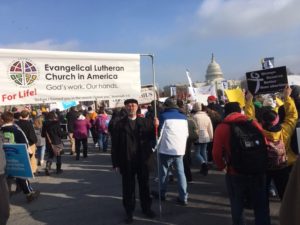 We have all heard much about the March for Life, especially in light of the events that took place near the Lincoln Memorial. I personally was not near the Memorial, so I cannot speak from personal observation. But I am very glad for recent reports which have exonerated the students from the Catholic school in Kentucky.
We have all heard much about the March for Life, especially in light of the events that took place near the Lincoln Memorial. I personally was not near the Memorial, so I cannot speak from personal observation. But I am very glad for recent reports which have exonerated the students from the Catholic school in Kentucky.
The main thing I would want to share is how deeply impressed I was with the very large number of young adults who were enthusiastic participants in the March. We constantly hear about the conspicuous absence of young people from our churches. Younger people are not attending traditional denominational churches. And it is not just the Lutheran churches. We wonder what will happen to our churches if we continue to be unable to reach younger people. 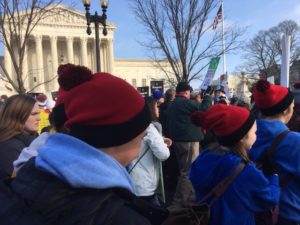 And yet somehow the pro-life movement has been able to catch the attention and capture the enthusiasm, energy, and commitment of the millennial generation. Our churches, and many other groups that promote traditional values, have much to learn from the pro-life movement. How could we place ourselves in a position for that movement to teach us?
And yet somehow the pro-life movement has been able to catch the attention and capture the enthusiasm, energy, and commitment of the millennial generation. Our churches, and many other groups that promote traditional values, have much to learn from the pro-life movement. How could we place ourselves in a position for that movement to teach us?
There are two other things I would like to say. First, how clean the march route was after the event. The crowd was huge, but they were polite and respectful in addition to being massive. Second, how deeply I was moved at the end of the route, in front of the Supreme Court Building, by all the signs which read, “I Regret My Abortion.” What can we do to help keep more women from making a choice and taking an action that later they will regret? The song that was sung at the end of the National Memorial Service for the Pre-Born and Their Mothers and Fathers earlier that morning contained these words: “What was your name? What were you meant to be? I wish I could have known.”
I remember a several year period – during the years when I was serving as a pastor before I retired – when I would have jumped at the chance to be able to attend a gathering which was intended to help me regain my first love. I recall the energy, enthusiasm, and optimism with which I began my ministry. I served the same congregation for forty years. After eighteen years there we completed a major, two-million-dollar development of the property, including the building of a new sanctuary and fellowship hall. But then, immediately afterwards, began a process in which all hell broke loose.
One of the major families in the congregation became intensely angry with me. For a full year I received hate mail from them, as often as three times in the same day. When the congregation council finally stood up to them, they left. During the same time, as well as immediately afterwards, I was accused of having an affair with one of the staff members, our school principal was accused of embezzling funds, and the rumor was that there must be a reason why the school principal was able to blackmail me into being silent. For years this kind of behavior was tolerated and allowed to continue. When it was finally confronted, the inevitable blow up occurred, and everyone who was contributing to the problem, as well as everyone else whom they could influence, left within a matter of a few weeks. I gained a new appreciation for Paul’s image of the church as the body of Christ. In order to be able to survive, a living organism must be able to get rid of highly toxic material. The church finally stood up to and was delivered from everyone who was engaging in highly toxic behavior. But the damage was done – to the congregation, as well as to my relationship with the congregation. I could have used a “Rekindle Your First Love” event.
For most of you I do not know what you are going through and have gone through. But I do know that ministry is tough. Jesus said that it is going to be tough. No wonder we need to put on the full armor of God.
I would strongly urge you to sign up today. We have a great group of presenters who will lead us in rekindling our first love for Christ, for the church as the body of Christ, and for mission and ministry as the work of Christ in the world. In addition we have a fourth presenter who will help us take the next steps as we move from rekindling to re-establishing the fire of our first love. The presenters represent a wide-range of church body affiliations – NALC, LCMC, and ELCA.
The contemporary Christian singer/song-writer, Keith Green, in his song “Oh Lord, You’re Beautiful,” sings these words –
“Oh Lord, please light the fire That once burned bright and clear. Replace the lamp of my first love.”
The date is Wednesday, May 1. The location is Trinity Lutheran Church in Warrenton, Virginia (the same location as for the NALC Life Conference). Here is a link that will take you to the flier that will tell you more about the gathering and how you can register. I urge you to do so today.
Blessings in Christ,Dennis D. Nelson Executive Director of Lutheran CORE [email protected] 909-274-8591